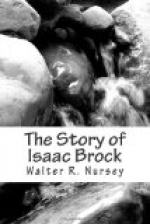Brock knew that the valorous Hull, dismayed at the advance of the British, had recrossed the river with all but 250 of his men and was hard at work on the defences of Fort Shelby, behind which he had retired. Brock also knew of the affair at Brownstown, where the Indian chief Tecumseh, with twenty-five warriors, had separated himself from Major Muir’s detachment, sent to intercept a transport on its way from Ohio to Detroit with supplies for Hull. He had been told of the stratagem by which the great Shawanese warrior had ambushed the 200 American soldiers, near the Raisin River, who had marched from Detroit to escort this convoy and the mails. Seven American officers were killed at the Raisin, twelve of all ranks wounded, and seventy reported missing after the fight. In addition to the provision train, Tecumseh captured what was of much greater importance, another batch of Hull’s despondent despatches. It was here that swift justice overtook the scalping Captain McCullough, of Hull’s spies, who himself met with the fate of his former victim—the fate he deserved.
Brock also received despatches describing the daring attack by Lieutenant Roulette, of the provincial marine, who in a small boat with a handful of men had boarded and seized in the Detroit River a brigade of eleven batteaux! These, loaded with food, were on their way from Black Rock, and now carried fifty-six wounded American soldiers and two English prisoners. This bold feat of “cutting out” took place under the eyes of an armed escort of 250 American soldiers marching along the river bank.
Messengers from Procter had also informed Brock of the fight at Maguagua, fourteen miles below Detroit. It was here that Muir, with 200 regulars and militia and less than 200 Indians, instead of waiting to be attacked, recklessly assailed a force of 600 Americans who were halted on the edge of the oak forest, supported by two six-pounder guns. Fighting without hope against such odds, the British were outflanked, Muir himself wounded, and an officer killed—the second British soldier to fall in the war of 1812. The American loss was eighteen killed and sixty-three wounded. Though the difference in arms and men was greatly in favour of the Americans, the British were enabled to retreat to the river, where they regained their boats. The American force, suffering from greater casualties, did not attempt to follow them.
Apart from the inferior strength of the British, the chief cause of their reverse at Maguagua was the blunder of some men of the 41st, who fired upon a body of Tecumseh’s Indians. In rushing from the woods the redmen were mistaken for the enemy, and falling into a similar error themselves, they returned with interest the fire of the British soldiers. The disorder that followed created a panic. While Tecumseh with his own Indians fought bravely, the seventy Lake Indians under Caldwell suffered from “chill” and fled at the first shot. The most encouraging of these facts, when told to the expedition, aroused in Brock’s followers a wild desire to meet Hull’s army in battle.




